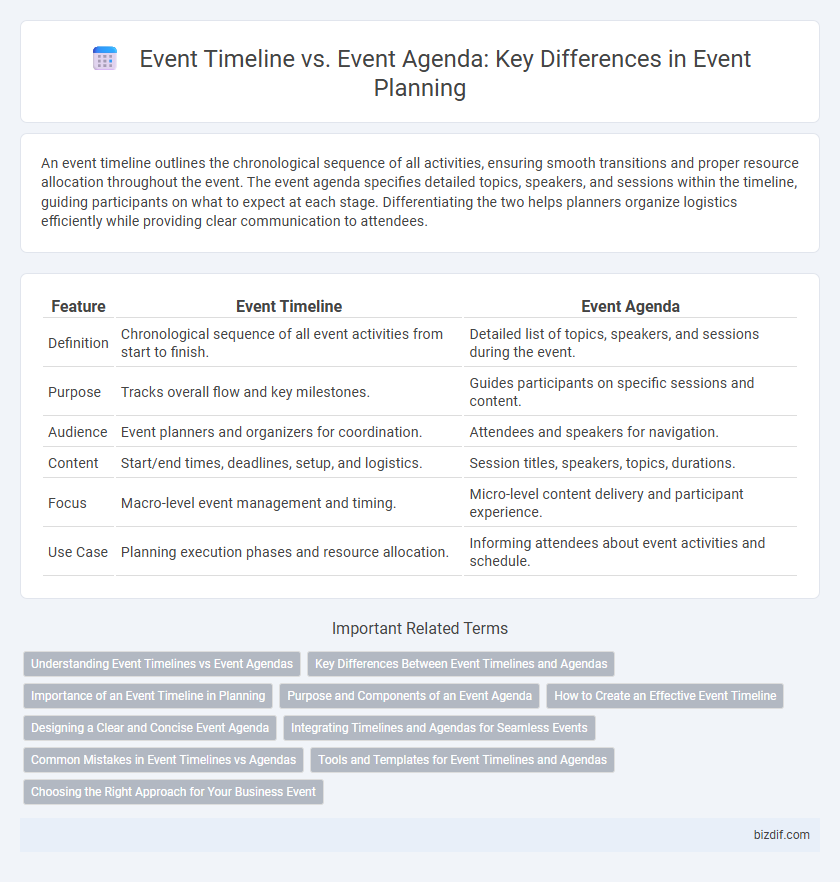An event timeline outlines the chronological sequence of all activities, ensuring smooth transitions and proper resource allocation throughout the event. The event agenda specifies detailed topics, speakers, and sessions within the timeline, guiding participants on what to expect at each stage. Differentiating the two helps planners organize logistics efficiently while providing clear communication to attendees.
Table of Comparison
| Feature | Event Timeline | Event Agenda |
|---|---|---|
| Definition | Chronological sequence of all event activities from start to finish. | Detailed list of topics, speakers, and sessions during the event. |
| Purpose | Tracks overall flow and key milestones. | Guides participants on specific sessions and content. |
| Audience | Event planners and organizers for coordination. | Attendees and speakers for navigation. |
| Content | Start/end times, deadlines, setup, and logistics. | Session titles, speakers, topics, durations. |
| Focus | Macro-level event management and timing. | Micro-level content delivery and participant experience. |
| Use Case | Planning execution phases and resource allocation. | Informing attendees about event activities and schedule. |
Understanding Event Timelines vs Event Agendas
Event timelines outline the chronological sequence of key milestones and deadlines leading up to and during an event, ensuring proper coordination and time management. Event agendas detail the specific schedule of activities, sessions, and speaker presentations planned for the event day, providing attendees with a clear overview of what to expect. Distinguishing between timelines and agendas helps planners maintain organized workflows while delivering a seamless event experience.
Key Differences Between Event Timelines and Agendas
Event timelines outline the chronological sequence of tasks and deadlines leading up to an event, ensuring smooth preparation and coordination among teams. Event agendas focus on the detailed schedule of activities, sessions, and speakers during the event itself, guiding attendees through the program. While timelines emphasize pre-event project management, agendas prioritize real-time event flow and participant engagement.
Importance of an Event Timeline in Planning
An event timeline is crucial for effective event planning as it outlines every task and deadline leading up to the event day, ensuring smooth coordination among teams and stakeholders. Unlike an event agenda that details the schedule of activities during the event, the timeline manages preparation phases, including vendor bookings, marketing, and logistics. Adhering to a detailed event timeline minimizes last-minute issues, optimizes resource allocation, and enhances overall event execution.
Purpose and Components of an Event Agenda
An event agenda serves as a detailed blueprint outlining the sequence of activities, specifying start times, speakers, and session objectives to ensure smooth coordination and clear communication among participants. Unlike an event timeline that tracks key milestones and deadlines throughout the planning process, the agenda focuses on the event day, highlighting components such as registration, keynote addresses, workshops, breaks, and networking sessions. This structured framework enhances attendee engagement and helps organizers monitor the flow of events in real time.
How to Create an Effective Event Timeline
Creating an effective event timeline requires detailed scheduling of each activity, from setup to teardown, ensuring smooth transitions and time management. Prioritize key milestones such as registration, keynote speeches, breaks, and networking sessions, allocating time buffers for unexpected delays. Utilize digital tools for real-time updates and collaborate with vendors and staff to maintain adherence to the timeline for successful event execution.
Designing a Clear and Concise Event Agenda
Designing a clear and concise event agenda requires a detailed timeline that sequences every activity with precise start and end times, ensuring smooth transitions and optimal time management. A well-structured event agenda highlights key sessions, speakers, and breaks, enhancing attendee engagement and overall experience. Integrating the event timeline into the agenda creates a cohesive plan that keeps organizers and participants on track throughout the event.
Integrating Timelines and Agendas for Seamless Events
Integrating event timelines and agendas ensures seamless coordination by aligning key milestones with detailed activity schedules, optimizing resource allocation and participant engagement. A well-structured timeline highlights critical deadlines and dependencies, while a comprehensive agenda delineates session flow and speaker timings, enabling real-time adjustments. Utilizing digital collaboration tools enhances synchronization between planners and stakeholders, minimizing disruptions and maximizing event success.
Common Mistakes in Event Timelines vs Agendas
Confusing event timelines with agendas often leads to mismanagement, as timelines emphasize scheduling and sequencing of tasks while agendas outline detailed content and activities during the event. A common mistake is neglecting to allocate buffer times in timelines, causing delays that disrupt the agenda's flow and attendee experience. Overloading agendas without considering realistic timeline constraints results in rushed sessions and reduced participant engagement.
Tools and Templates for Event Timelines and Agendas
Effective event planning relies on specialized tools and templates to streamline event timelines and agendas, ensuring precise scheduling and task management. Timeline tools like Smartsheet and Asana provide visual Gantt charts for tracking milestones, while agenda templates from platforms like Canva and Microsoft Word offer customizable formats for detailed session planning. Utilizing these resources enhances coordination and clarity, optimizing overall event execution and participant engagement.
Choosing the Right Approach for Your Business Event
Selecting the appropriate framework between an event timeline and event agenda depends on your business event's scale and objectives. Event timelines provide a chronological overview of key milestones and deadlines, ensuring efficient project management and resource allocation. Event agendas offer detailed session-by-session content, helping attendees understand the flow and focus areas, enhancing engagement during conferences or workshops.
Event timeline vs Event agenda Infographic

 bizdif.com
bizdif.com